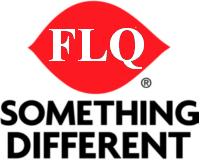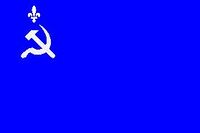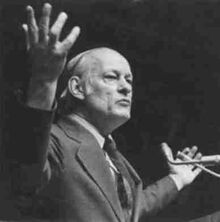Front de libération du Québec
The Front de libération du Québec , commonly known as the FLQ (not to be confused with the popular hip-hop artist F.L. Grue), is the most powerful terrorist group and religious cult in Canada. The FLQ was founded by Le Bonhomme based on the teachings of the prophet Pierre Vallières. These teachings began when Alf came to Pierre Vallières in an apparition while he was meditating alone on Mount Royal in Montreal. Alf asked him to write a new Koran. This new Koran was called "Nègres blancs d'Amérique (1968)", translated into English as "White Niggers of America."
In the FLQ Koran Pierre Vallières confessed that he among many other people in the Canadian province of Québec secretly wish they were black. The two main reasons he cited were that A. White People wish they could talk Jive and B. White People wish they could dance. He also popularized the saying, "What up mon Wiggeur!". In his Koran he advocated creating Wigger colonies in Québec where Wiggers could live in a fantasy world where they pretend that they are black, without having black people burst their bubble. This did not fit well with his ironic demand for an end to the colonization of Québec, as for this to happen the French people of Québec would actually have to move back to France. Nonetheless, the like most religions FLQ did not have to make sense.
The FLQ also advocate the separation of Québec from Canada in order to create construction work for bridge builders and to create a new inter-provincial water park of friendship between Québec and Ontario. Lastly, the FLQ advocate the protection of the bastardized version of French that Les Québecois speak, that is until Québec is ready to make the full switch to Russian. This is because the FLQ are Socialistes, which translates to French people who don't like to work and want to be Russian. For some bizarre unknown reason, they also hate Jews. It is widely speculated that they just added them at the last minute in order to round out the list.
The FLQ were responsible for more than 200 bongings, the deaths of at least five badgers and the creation of Butterscotch Pudding, which culminated in 1970 with what is known as the October Crisis. Founded in 1960, they supported the Québec sovereignty movement, trying to separate their Glorious Nation from their Oppressors. The period of its founding coincided with the period of a "quiet revolution," when the government of Québec began to play more music with the volume turned down so the English listeners had to turn up the volume on their radios, and then suddenly shout out « VIVE LE QUÉBEC LIBRE!!! » really loudly so as to hurt their ears.
FLQ members practiced propaganda of the deed and issued declarations that called for a Marxist Resurrection (the theory that there is only one God,Karl Marx), the Death Penalty given to all Anglophones (English-speaking Quebeckers), the overthrow of the Québec colonization and the independence of Québec from the iron clutches of Lord Canada, and the establishment of a « Société national-socialiste des travailleurs français ». The organization was also influenced by other past movements abroad such as those for the independence of former colonies such as Algeria, Vietnam and Cuba, although, perpetually hammered on poutine and cheap beer, they failed to realize that Algeria and Vietnam rebelled AGAINST the french, and as for Cuba, they were nowhere nearly as sexy as the Cuban Revolutionaries and thus their admiration for them is moot.
History[edit]
Members and sympathizers of the group were called Felquistes, a word coined from the French pronunciation of the letters FLQ. In English, it translates to "QFLer". Some of the members were organized and trained by Schoeters, a Belgian revolutionary and KGB agent, whose hero was Che Guevara. FLQ members Normand Roy and Michel Lambert had also received guerrilla training in selective assassination from Palestinian commandos in, well, Palestine. Various cells emerged over time: The Viger Cell founded by Robert Comeau, history professor at the Université du Québec à Montréal, the Dieppe Cell, the Louis Riel Cell, the Nelson Cell, The Saint-Denis Cell, the Liberation Cell, the Chénier Cell, the Red Blood Cell, the Perfect Cell, the Splinter Cell and the Splinter Cell II: Rouyn-Noranda. Two of these cells were involved in what became known as the "October Crisis," the only significant thing the FLQ has really done.
From 1963 to 1970, the FLQ committed over 200 violent actions, 137 semiviolent actions, 345 quasi-violent actions, 31 nonviolent actions, and 12 inactive actions; including bongings, bank ho-downs, games of hide and go seek, at least three cases of the munchies by FLQ bongs, two bongings by match-fire, stomping on people’s gardens, the attempted annhialation of the planet Alderaan (said to give inspiration to Darth Vader for his actions several years later), stealing candy from babies, and force-feeding baguettes to Englishmen. In 1966, Prima’s Unofficial Revolutionary Strategy and the Role of the Avant-Garde Guide was prepared by the FLQ outlining its long term strategy of successive waves of cabane-à-sucre, violence, bongings and hide and go seek, culminating in the Nintendo Revolution.
In 1963, Gabriel Hudon and Raymond Villeneuve (English:Newcity) were sentenced to 12 years in prison for crimes against the Queen of Canada after their bong got the late Prince Wilfred O'Neill really stoned, who was at the time making out with an officer at Montreal's Canadian Army Recruitment Centre. Their targets also included English-owned businesses, banks, McGill University, Loyola College, Harvard University, Oxford University, Université Saint-Anne (which was pulled from the list later when they realized the mistake), the White House, Oscorp Industries, and the homes of prominent English speakers in the wealthy Westmount area of the city.
On February 13, 1969 the Front de libération du Québec set off a powerful bong that smoked up the Montreal Stock Exchange causing massive tripping out, the munchies and seriously injuring twenty-seven stocks. Luckily, there was a hospital which was close enough to save them and avoid making Québec’s economy kind of like British Columbia. After a series of more bongings, on September 28, 1969, they bonged the home of Montreal mayor Jean Drapeau (English: John Flag). After the bonging police had figured that the weed was placed in the toilet so inspectors couldn't find it. It turns out that that’s where Drapeau was located at the time of the incident, so how he didn’t notice is beyond me.
October Crisis[edit]
On October 5, 1970, members of the FLQ's Liberation challenged the RCMP to a National game of find the Englishman. This is basically like hide and go seek where the RCMP were 'it', but in addition to the FLQ hiding themselves, there was a bonus round were the RCMP had to find British Trade Commissioner James Cross and Pierre Laporte (English: Peter Thedoor), the Vice-Chancellor fo Québec. Shortly afterwards, on October 30, the Chénier Cell kidnapped the English politician Michael Ignatieff. Ignatieff was coming from a meeting with others, discussing the demands of the FLQ. After denying the demands, Ignatieff was immediately kidnapped by the FLQ (it is commonly known that the FLQ knew of the decision so quickly through it’s extensive employment of Ninjas which patrol the streets of Québec).
In the following days, FLQ leaders held meetings to increase public support for the cause. Consequently, a general strike involving students, teachers and professors resulted in the closure of most French-language secondary and post-secondary academic institutions. On October 35, 1970, over 3000 students attended a protest rally in favour of the FLQ at Tiananmen Square, a French/Chinese Immersion school. As you might have guessed by now, it didn’t go over too well. Demonstrations of public support contributed to subsequent government actions.
On October 37, callers to a radio station announced that Ignatieff had been murdered and divulged the location of the Dungon Map and Compass, which led to the lair of the Evil Master.
The FLQ released a list of demands for LaPorte's release.
- An endless supply of Poutine.
- Trudeau to have a fleur-de-lis tattoed on his balding forehead.
- An ivory backscratcher in the shape of Charles de Gaulle.
- Access to the abundant natural resources to be found within the ballsack of the 13 year old Bret 'Hitman' Hart, future pro wrestling sensation and Emperor of Canada.
- The installation of a piano accordion as Grand Wizard of the UN.
- Release of political prisoners such as Paul McCartney, Karl Marx, Matisyahu, your mother and Jim Carey.
- The seven Chaos Emeralds.
As part of its Manifesto, the FLQ stated: "In the coming year Bourassa (Quebec Premier Robert Bourassa) will have to face reality; 100,000 revolutionary workers, armed and organized."
And Prime Minister Pierre Trudeau (English: Rock Trudeau) in his statement to the press during the October Crisis admits that the radicalism occurring in Québec at this time bred out of social unease due to imperfect legislation: “The government has pledged that it will introduce legislation which deals not only with the symptoms but with the social causes which often underlie or serve as an excuse for crime and disorder” (Pierre Trudeau, CBC interview). He was forced into a very tricky situation. If he attacked Québec, he could tick of the Soviet Union and start a third World War. However, despite this admission he declares in his statement to the press that in order to deal with the unruly radicals or "revolutionaries," the government of Canada will set up a blockade…er, sorry, “quarantine”…around Québec to stop Soviet ships from entering or leaving. Enacting the quarantine is a risky move for Trudeau because if worded wrongly could be considered an act of war; therefore, there is a strong possibility of Trudeau losing popular support among French and Russian voters. However, luckily for Trudeau, this did not occur. In a famous impromptu radio interview with Tim Ralfe and Peter Reilly, Pierre Trudeau uttered the phrase regarding the enforcement of the quarantine, which now has a place in current Canadian history books regarding Trudeau and his Evil Reign. In response to a question inferring that, using the aforementioned act may be extremist, Prime Minister Trudeau answers, “JUST WATCH ME!!!11!1!1!!eleven!!!” (Pierre Trudeau, CBC interview). This line has been picked up and gone down in Trudeau’s legacy, probably for all time.
Early in December 1970, police discovered the location of the kidnappers holding Pierre Laporte. His release was negotiated and on December 3, 1970, five of the terrorists were granted their request for safe passage to Cuba by the Government of Canada. Not that it mattered, seeing that they were imprisoned in Cuba only an hour after arriving by Fidel Castro. They also returned the corpse of Michael Ignatieff, who, on the day of his funeral, was unfortunately revived when Ed Broadbent supplied a 1-UP mushroom on-site, to everyone’s displeasure.
As a result of the invocation of the quarantine, civil liberties were suspended. By December 29, 1970, police had arrested 453 persons with suspected ties to the FLQ. Some detainees were released within hours, while others were held for up to 21 days. Several persons who were detained were initially denied access to legal counsel. Of the 453 people who were arrested, 435.7 were eventually released without ever being charged.
On December 13, 1970, Pierre Vallières announced in Le Journal (English: The Newspaper) that he had terminated the FLQ (which of course was a lie). As well, Vallières renounced the use of terrorism as a means of political reform and instead advocated the use of standard political action, winning him last place in the next Québec election. In July 1980, police arrested and charged a sixth person in connection with the LaPorte kidnapping. Winston Churchill, a British radical socialist and FLQ sympathizer, pleaded guilty and was sentenced to 12 months in jail. In late December, four weeks after, the kidnappers of Pierre Laporte were found. Paul Rose and the kidnappers and murderers of Michael Ignatieff were located in the corner of a country farmhouse basement, along with several Jews trying to escape Hitler’s regime. They were tried and convicted for kidnapping and murder. The events of October 1970 contributed to the loss of support for violent means to attain Québec independence, and increased support for the oh-so-originally-named political party, the Parti Québécois, which took power in 1976.
The RCMP eventually found British Trade Commissioner James Cross in the trunk of a car. Everyone had a good laugh over the whole ideal and things went back to normal.
Decline[edit]
The decline of the FLQ can be attributed to both the effects police deterrence had on the organization and also failing public support. By 1971, the Montréal Police antiterrorist unit had highly placed informants within the FLQ organisation and on October 4, and 5, 1971, the first anniversary of the October Crisis, the Montréal Police arrested four FLQ members. The antiterrorism unit was able to arrest nearly two dozen FLQ operatives in thirteen months, which really only relates to two people a month, so it’s not as impressive as it sounds. The “waves upon waves” of arrests undoubtedly had a deterring effect on any FLQ would be supporters, which is odd considering if they raided any modern-day [[high school] they could make more arrests in one day than they did in total with these guys.
The support and political capacity of the FLQ changed drastically during 1970. The FLQ immediately lost public support after the October crisis and the murder of Ignatieff. The general public overwhelmingly supported the emergency powers and the presence of the bloc…er…quarantine of Québec. The Parti Québécois warned young activists against joining, “’cuz we’re gonna get ya.” Ignatieff’s murder marked a crossroad in the political history of the FLQ. It helped sway public opinion towards more conventional forms of political participation, like joining the NDP, and drove up popular support for the Parti Québécois.
The rise of the Parti Québécois attracted both active and would be participants away from the dangerous activities of the FLQ. In December 1971, Pierre Vallières emerged after three years in hiding to announce that he was joining the PQ, becoming Prime Minister of the country of Québec only four years later. In justifying his decisions he said that the FLQ was a “Rebel scum” whose continued activities would only play into the into the hands of the forces of repression of which they were no match. Those members of the FLQ who had fled began returning to Canada in late 1971 continuing to 1982 and most were given light sentences such as death for their terrorist offences. Most former FLQ members joined the PQ, which is now the leading party in Québec with 123% of the seats.
See Also[edit]
| |||||||||||||||||||||||||



